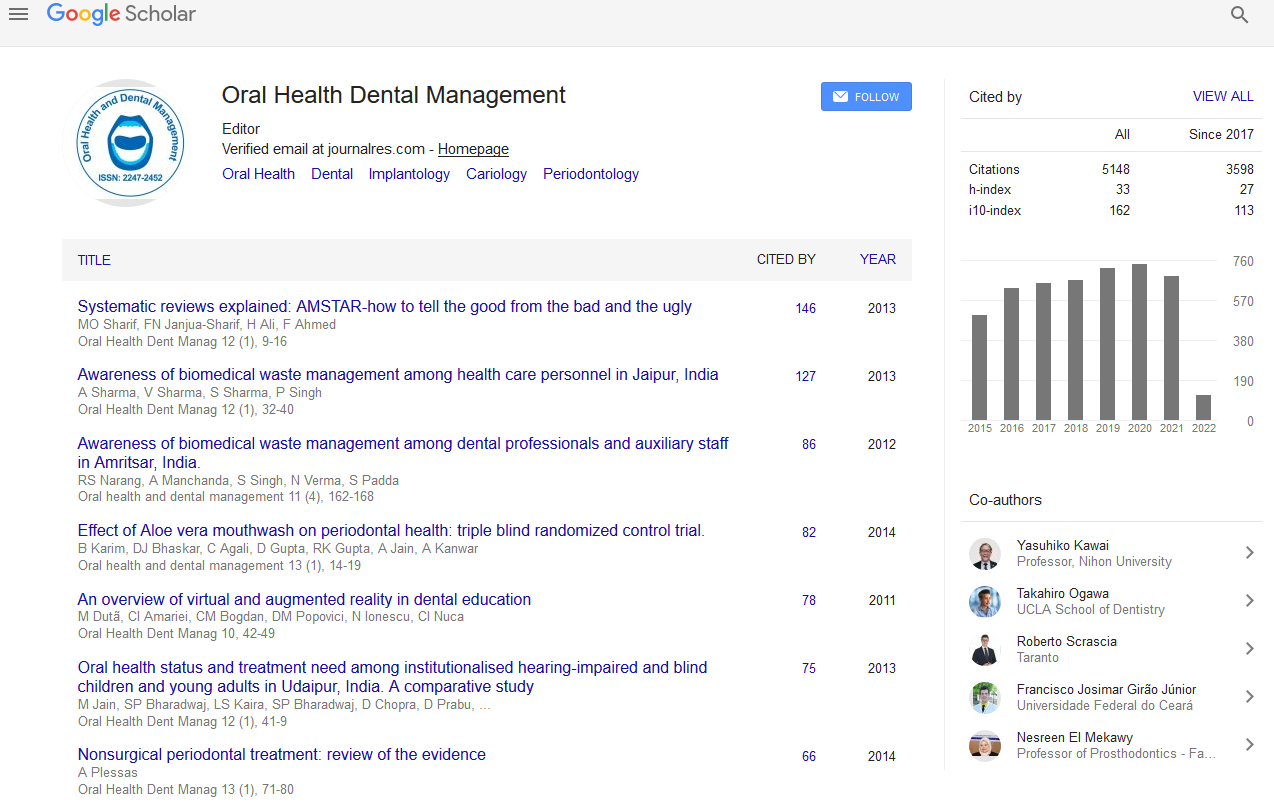Indexed In
- The Global Impact Factor (GIF)
- CiteFactor
- Electronic Journals Library
- RefSeek
- Hamdard University
- EBSCO A-Z
- Virtual Library of Biology (vifabio)
- International committee of medical journals editors (ICMJE)
- Google Scholar
Useful Links
Share This Page
Journal Flyer

Open Access Journals
- Agri and Aquaculture
- Biochemistry
- Bioinformatics & Systems Biology
- Business & Management
- Chemistry
- Clinical Sciences
- Engineering
- Food & Nutrition
- General Science
- Genetics & Molecular Biology
- Immunology & Microbiology
- Medical Sciences
- Neuroscience & Psychology
- Nursing & Health Care
- Pharmaceutical Sciences
Childrenâs self-care practices in Pyongyang, Democratic Peopleâs Republic of Korea: Comparison of childrenâs and their guardianâs reports
4th Asia Pacific Congress & Expo on Dental and Oral Health
July 27-29, 2015 Brisbane, Australia
Pirkko-Liisa Tarvonen1, Kirsi Sipil�1, Yang Gon Suk2, Kim Jong Kil3, Ri Yon Sil3 and Liisa Suominen1
ScientificTracks Abstracts-Workshop: Oral Health Dent Manag
Abstract:
Objectives: The aim of this study was to evaluate the oral self-care practices among primary school children in Pyongyang, Democratic People?s Republic of Korea (DPRK), after six years operations of Children?s Oral Health Promotion Programme (COHPP). Methods: The COHPP as part of the development collaboration has educated kindergarten and primary school teachers in oral self-care; the teachers in turn have educated children and their parents along with the school work. The COHPP has also provided toothbrushes and fluoride toothpaste for children, and education materials for kindergartens and primary schools. After six years operations of the programme, in September 2013 a convenience sample 200 children (10 years of age) and their 200 guardians were selected for the study. Both groups were separately asked by structured, self-completed questionnaires about the child?s brushing frequency, use of fluoride toothpaste, use of sweet snacks (juice, ice cream, candy and biscuit) as well as the child?s main thirst quencher. Children?s own report was compared to the guardian?s report. Results: Brushing twice a day was common; 89% of the children and 78% of the guardians reported the child brushing his / her teeth at least twice a day. Of the reports 71% were unanimous; no association observed (p=0.239). All children and 92% of parents reported the child using fluoride toothpaste. Furthermore, snacking was popular: 90% of the children and 88% of parents reported the child eating sweet snacks at least twice a day, the unanimity being significant (p=0.047). 72% of children and 80% of parents reported the child using water as the main thirst quencher; others drank juice, cider, tea or milk. No association between the reports was observed (p=0.446). Conclusions: The COHPP has probably promoted beneficial self-care practices in its action sphere. However, sweet snacks were popular among primary school children. Implementation of the program to the whole country is important as is continuous evaluation.
Biography :
Dr. Pirkko-Liisa Tarvonen graduated and specialized in public health care at University of Turku, Finland. With thirty years of experience in dental public health, she works as Senior Dental Officer at University Dental Clinic in Helsinki, Finland. She has also gained experience as project coordinator to develop patient classification model and to organize out-of-hours emergency oral health care as well as national information systems for oral health care. Since 2007, she has worked voluntarily as project coordinator in a development collaboration project to support primary oral health care and dental education in Democratic People?s Republic of Korea.

